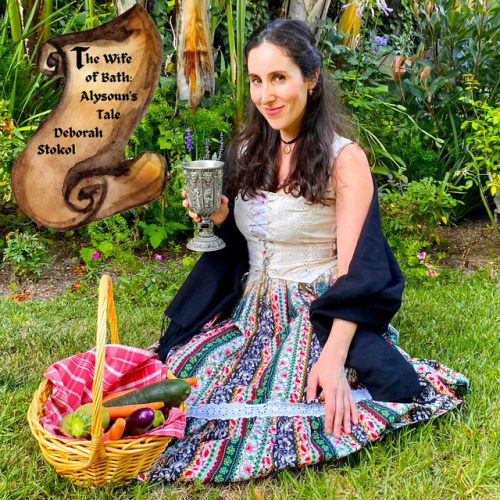The Wife of Bath is named Alysoun.
She is not the only traveler in The Canterbury Tales to have a name–the Miller is named Robin, and the Prioress is named Sister Eglantine–but the inclusion of her name in the title of Deborah Stokol’s sprawling “The Wife of Bath: Alysoun’s Tale” seems purposeful. As with the Miller or the Prioress, people who have read their Chaucer will understand who you’re talking about if you just refer to Alysoun by her title. But Stokol’s song, an adaptation of the proto-feminist tale told by the fictional Wife of Bath in The Canterbury Tales, makes it clear that Alysoun’s character runs much deeper than being somebody’s wife–or indeed, the wife of five somebodies.
Deborah Stokol is a singer, a songwriter, and a folklorist, whose music takes inspiration from the oral tradition: she has made music inspired by the works of Homer, as well as Beowulf. When tackling “Alysoun’s Tale,” Stokol takes influence not only from medieval music but from the more contemporary folk music of the 60s and 70s inspired by medieval music: you can definitely hear a touch of Pentangle to this song.
“Alysoun’s Tale” was borne from a desire to make Chaucer, whose seminal work helped elevate English to the lingua franca it is today, relevant to modern audiences; this may not square with the 60s folk revivalism at first glance, but there’s no precious affectation to Stokol’s performance, no Ren Faire theatricality. The song’s twelve-minute runtime is dominated by Stokol’s steady Spanish guitar and her voice, which is clear, focused, and direct.
The tale itself is about one of King Arthur’s knights, who, upon being found guilty of raping a woman, is told to find what women most desire; if he fails, he will be executed. At first, the knight is frustrated, asking women far and wide but never getting the same answer twice. He finds an old, wise woman, who makes him promise her a favor before giving him the answer: women most desire sovereignty over themselves and control over their own lives. In exchange, she demands his hand in marriage, and demands he choose between a beautiful yet unfaithful wife or an unattractive yet loyal one. Unable to pick, he realizes what women truly want, and lets her decide for herself; satisfied, she becomes young and beautiful.
The tale is retold faithfully by Stokol, and it’s an excellent listen if you’d like to broaden your horizons and dabble in medievalism. But just as interesting is the prologue, which takes up the first four minutes of the song and illustrates Alysoun’s character while also understanding what makes her so compelling. In Chaucer’s tale, she represents the Wife from Hell: domineering, manipulative, serially unfaithful, and a shameless gossip. In her knowing embodiment of a man’s worst nightmare, she’s comparable to Gone Girl’s Amy Dunne; also like Amy Dunne, Alysoun runs deeper.
Although she plays the part of the blowsy gossip, Alysoun is intelligent and well-read, possessing an independent spirit that’s still going strong in her sixties. Stokol nails her essence with this line towards the end of the prologue, where she describes wearing a bold red dress: “I’ll wear it often around this town/and my friends and lovers, well they like that gown/but what matters most is that I like it all myself.”







